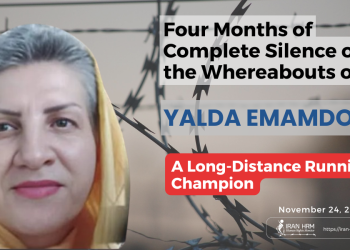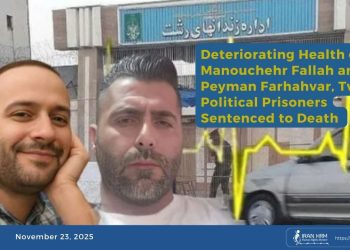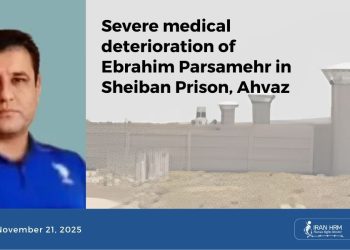Introduction – Raid by Security Guards and Forced Transfer
At dawn on Friday, August 8, 2025, during the transfer of prisoners from Fashafouyeh Prison to Evin Prison, anti-riot guards attacked and brutally beat five political prisoners sentenced to death on charges of “membership in the People’s Mojahedin Organization of Iran”; Vahid Bani-Amerian, Pouya Ghobadi, Shahrokh Daneshvarkar, Mohammad Taghavi, and Babak Alipour; separating them from the other prisoners. Without any prior notice to their families and without the possibility of contact, they were taken to an unknown location, later confirmed to be Qezel Hesar Prison in Karaj.
Eyewitnesses reported that other prisoners present at the scene began chanting anti-government slogans in protest, and were themselves immediately subjected to severe beatings by the guards.
All five political prisoners mentioned above were sentenced to death in December 2024 by Revolutionary Courts on charges of “membership in the People’s Mojahedin Organization of Iran” and “armed uprising.”
Significance of the Transfer to Qezel Hesar
Qezel Hesar Prison, particularly Ward 2 known as the “Death Camp,” is the primary execution site in Iran. The transfer of these prisoners to such a facility, immediately after a violent separation, is a grave indicator of the likelihood of imminent execution.
This action comes only a short time after the secret execution of two political prisoners, Behrouz Ehsani and Mehdi Hassani, following their sudden transfer to Qezel Hesar; a pattern that could very well be repeated in these cases.
Separation and transfer to a section of Qezel Hesar commonly used to isolate death row inmates and cut off their communication with the outside world deprives them of basic rights such as phone calls, visits, and access to legal counsel, making it nearly impossible to monitor their condition.
Purpose of This Action
This separation and transfer is a deliberate measure to close off any avenue for legal or media intervention in the final days or even hours before execution. In this way, intense psychological pressure is exerted on the prisoners, placing them in a state of isolation and uncertainty — conditions that are often the prelude to carrying out death sentences in secret.
Resilient Prisoners Facing Execution
Vahid Bani-Amerian – 33 years old, Master’s degree in Management from Sonqor. He has been arrested multiple times for political activities and endured 48 days of severe torture. Despite pressure, he refused to sign forced confessions and has been sentenced to death and exile.
Pouya Ghobadi – 33 years old, Electrical Engineer from Sonqor. Arrested several times on charges of “membership in the People’s Mojahedin Organization of Iran” and political activism. Subjected to torture during interrogations, he has remained committed to his ideals and now faces a death sentence.
Babak Alipour – 34 years old, Law graduate from Amol. He has served several years in prison and developed serious illnesses while in detention. Despite deliberate denial of medical care, he has stood firm under pressure.
Shahrokh (Akbar) Daneshvarkar – 58 years old, Civil Engineer from Tehran. He has been arrested numerous times for political reasons and is now sentenced to death plus 15 years in prison. A constant protester against unfair sentences.
Seyed Mohammad Taghavi – 59 years old, a political prisoner since the 1980s with a long history of imprisonment and exile. He has gone on multiple hunger strikes to protest inhumane conditions and is now facing imminent execution.
International Condemnation and Urgent Warnings
The death sentences against these five prisoners have repeatedly drawn reactions from international bodies. Amnesty International and Professor Javaid Rehman, the UN Special Rapporteur on the situation of human rights in Iran, have issued multiple statements describing these verdicts as the result of grossly unfair trials, forced confessions under torture, and denial of legal counsel, calling for their immediate annulment.
On August 8, 2025, Amnesty International issued an urgent and unusually strong statement warning:
“The sudden transfer of these five political prisoners and one security prisoner to Qezel Hesar Prison could be a prelude to their executions in the coming days. Iranian authorities must immediately halt all plans to execute these five prisoners. They were sentenced to death following a grossly unfair trial marred by allegations of torture, denial of access to a lawyer during detention, and lack of adequate legal care. Urgent global action is needed to save their lives.”
The organization recalled the cases of Behrouz Ehsani and Mehdi Hassani, who were executed in silence after being suddenly transferred to Qezel Hesar, and urged the international community to act swiftly, using all diplomatic and legal means to stop these executions.
Conclusion and Call for Urgent Action
Given this pattern and the high risk of execution, every day of delay could cost the lives of these five prisoners.
We call on the UN Human Rights Council, the European Union, governments committed to the abolition of the death penalty, and all international human rights bodies to:
1. Immediately halt the execution of these five prisoners.
2. Guarantee their immediate and unrestricted access to lawyers and family visits.
3. Establish an independent fact-finding mission to investigate allegations of torture and the judicial process in their cases.
4. Impose targeted sanctions on officials responsible for these violations, including judges and prison authorities.
Silence and inaction by the international community will be seen as a green light for the continuation of political executions and the intensification of repression in Iran.







